Biennial Latine Mental Health Conference
Thank you for making our 2024 virtual conference
such a success!
See below for highlights from this year’s event.
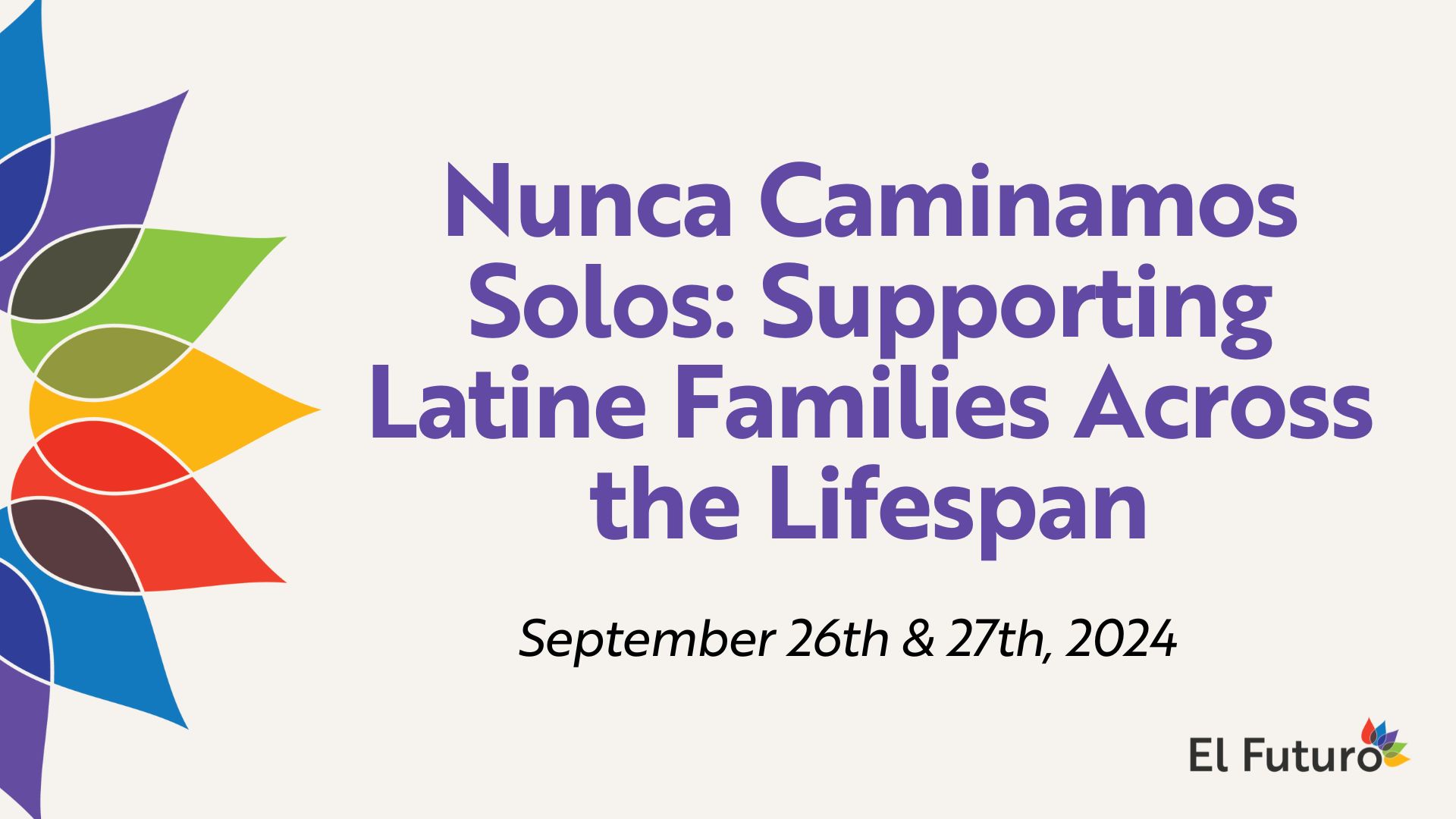
What Is This Conference About?
Mental health professionals working with the Latine community may find themselves engaging with more than just the individual in the room, often including a clients’ social systems into treatment. However, providers typically operate within a health-care framework that focuses on treating individuals, or their symptoms, in isolation. El Futuro’s 2024 Conference, Nunca Caminamos Solos: Supporting Latine Families Across the Lifespan, centers on exploring the nuanced ways in which families and social contexts can connect to the mental health and well-being of our Latine clients.
Using a developmental approach, national speakers invited to participate in this 2-day virtual conference will guide participants through life’s developmental stages, discussing the interplay of family systems and social context within each, and their role in mental health treatment. Each 90-minute session will offer practical tools and evidence-based approaches to support family systems integration to client care, all with the goal of moving us towards El Futuro’s mission: Nurturing stronger familias to live out their dreams.
This professional development opportunity has been developed for professionals and providers who work with the Latine community and their mental health concerns.
2024 Conference Schedule
Check our awesome lineup for 2024!
Thursday, September 26th
Collective Wounding & Healing: Supporting Young Children & Families Recover from Immigration-Related Trauma
Vilma Reyes, Psy.D.
Trauma and healing have always been part of our story as humans. We will explore the pervasive impact of intergenerational, systemic, and interpersonal trauma on young children, families, and communities. The speaker will introduce a relationship-based approach to restore relational safety, understand young children’s behavior and support families to reclaim the wisdom and agency that already dwells within them. The speaker will also cover the impact of trauma on systems and introduce ways to prevent secondary traumatic stress and promote organizational wellness.
Sociopolitical & Trauma-Informed Practice with Latino Children of Immigrant Families
Carmen Valdez, Ph.D.
The presentation will define trauma and its impact on children and families, applying concepts of trauma at the individual, family, community, and societal levels for Latinx children and families. The speaker will describe an expanded ecological framework of immigration-related adverse childhood experiences (I-RACE) that captures the experiences of many low-income Latinx children and their immigrant families. Clinical implications of a sociopolitical and trauma-informed framework will be provided.
Mobilizing Family Involvement & Triggering the Healing & Health Promoting Power of the Latine Family
Daniel A. Santisteban, Ph.D.
Family based interventions are powerful in their ability to treat behavioral, substance use, and mental health presenting problems in adolescents and in strengthening family relationships. For diverse clients with unique life stressors and those whose cultural backgrounds emphasize a strong family orientation, these interventions are particularly attractive and ecologically valid.
We have worked to create and test a manualized family therapy that builds in flexibility and culture-related content. Our Culturally Informed and Flexible Family-Based Treatment for Adolescents (CIFFTA) is a multi-component adaptive family treatment focused on reducing adolescent behavior problems (i.e., substance use, self-harm), working with culturally relevant themes (e.g., discrimination and acculturation stressors), and strengthening core family processes (e.g., parenting and family support).
Family treatments are most powerful and effective when they can mobilize protective and healing factors. It takes special skill to do this while avoiding some of the minefields in family work. An important innovation is our online platform using simulated families so that we can help therapist learn and practice the skills needed to work effectively with Latine families. By building our own simulations, we can incorporate culture-related experiences and circumstances.
Friday, September 27th
Building Them Up: Supporting Latinx Identity in Family, School, & Community Settings
Deborah Rivas-Drake, Ph.D.
In this presentation, I will provide an overview of ethnic-racial identity among Latinx youth. I will describe different components of ethnic-racial identity, how it develops over time, and its implications for psychosocial, academic, and civic outcomes. I will identify some of the ways that having strong, healthy ethnic-racial identities can also protect Latinx youth from the negative impacts of exposure to racism and xenophobia. In the second part of this presentation, I will provide examples of how families, schools, and community settings play key roles in the formation and evolution of Latinx youths’ ethnic-racial identity development. Attendees will be invited to identify strategies they and others can use to the support the ethnic-racial identities of diverse Latinx youth.
Supporting Immigration-Impacted Young Adults Navigating Individual & Family Legal Vulnerability
Laura E. Enriquez, Ph.D.
This program will introduce the concepts of individual and family legal vulnerability as a framework to understand how exclusionary immigration policy negatively impacts Latino individuals, families, and communities. While individual legal vulnerability refers to the risks and stressors faced by undocumented immigrants, family legal vulnerability captures how individuals who are members of undocumented and mixed-status immigrant families collectively experience deportability, economic insecurity, and social exclusion. This program will focus on the experiences of immigration-impacted young adults, including those who are undocumented as well as the U.S. citizen children of undocumented immigrants. It will pay particular attention to two key developmental tasks that take place in young adulthood: educational and employment transitions, and family and romantic relationship decisions; both are impacted by legal vulnerability and yield significant stressors. The program will summarize prior research in this area and engage participants in identifying strategies to support the wellbeing of immigration-impacted young adults as they navigate individual and/or family legal vulnerability.
Mentes Fuertes: A Community Health Worker-Delivered Psychosocial Skill Program for Latinx Populations
Gabriela Livas Stein, Ph.D.
This presentation will provide an overview of the Mentes Fuertes (Strong Minds, Strong Community) CHW psychosocial skills program for adults with depression and/or anxiety symptoms. The presentation will cover results from a large, randomized control trial with 1044 participants (63% Latinx) and initial findings from a dissemination trial in North Carolina. The presentation will share how family processes impact the effectiveness of the program.
Understanding Mental Health Among Older Latinos: Navigating the Family Dynamic
Daniel Jimenez, Ph.D.
As a Cuban American psychologist, Dr. Jimenez will provide unique personal and professional insights on the differing needs of older Latinos by exploring psychiatric comorbidity, experiences with seeking, accessing, and engaging in treatment, and the unique cultural, psychosocial, and complex family dynamics that affect treatment outcomes. Tangible tools for developing and implementing culturally-sensitive, mental health focused interventions for older Latinos will be discussed with special attention placed on cultural adaptations and practical strategies that can be implemented to increase engagement and participation in mental healthcare.
Continuing Education
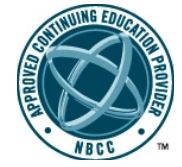
For participants that register for continuing education, this conference will provide up to:
*11.5 Contact Hours: Contact Hours include CEs for Social Workers, mental health clinicians, nurses, other healthcare providers, and several other disciplines who utilize contact hours.
*NBCC credit: this program is approved for 11.5 NBCC Hours
El Futuro has been approved by NBCC as an Approved Continuing Education Provider, ACEP No. 6947. Programs that do not qualify for NBCC credit are clearly identified. El Futuro is solely responsible for all aspects of the programs, including the awarding of NBCC credit.
Participants should confirm continuing education credit information for licensure requirements with their state licensing board(s). If you need any additional information about this webinar for your licensure, please reach out to us at lamesita@elfuturo-nc.org.
Please note that we are unable to provide partial credit for partial sessions attended. You will receive credit for all sessions you attend in full.
Meet Our Sponsors
Thank you to this year’s sponsors: Duke Health, the Hispanic/Latino Behavioral Health Center of Excellence, Camber Foundation, & a community donor for making this year’s conference possible.
Click the images below to learn more about this year’s sponsors!
Concern Response and Grievance Policy
We have carefully modeled the environment around our learning activities to be one characterized by mutual collegiality, kindness, and a commitment to constant learning. This environment allows for providers of all disciplines, regardless of their level of experience, to feel comfortable in taking part in and benefiting from our programming. It is our hope that all La Mesita members will join us in preserving this environment we have cultivated over the years through your participation across our programming.
You can request our full grievance policy or submit a concern by reaching out to us at lamesita@elfuturo-nc.org.

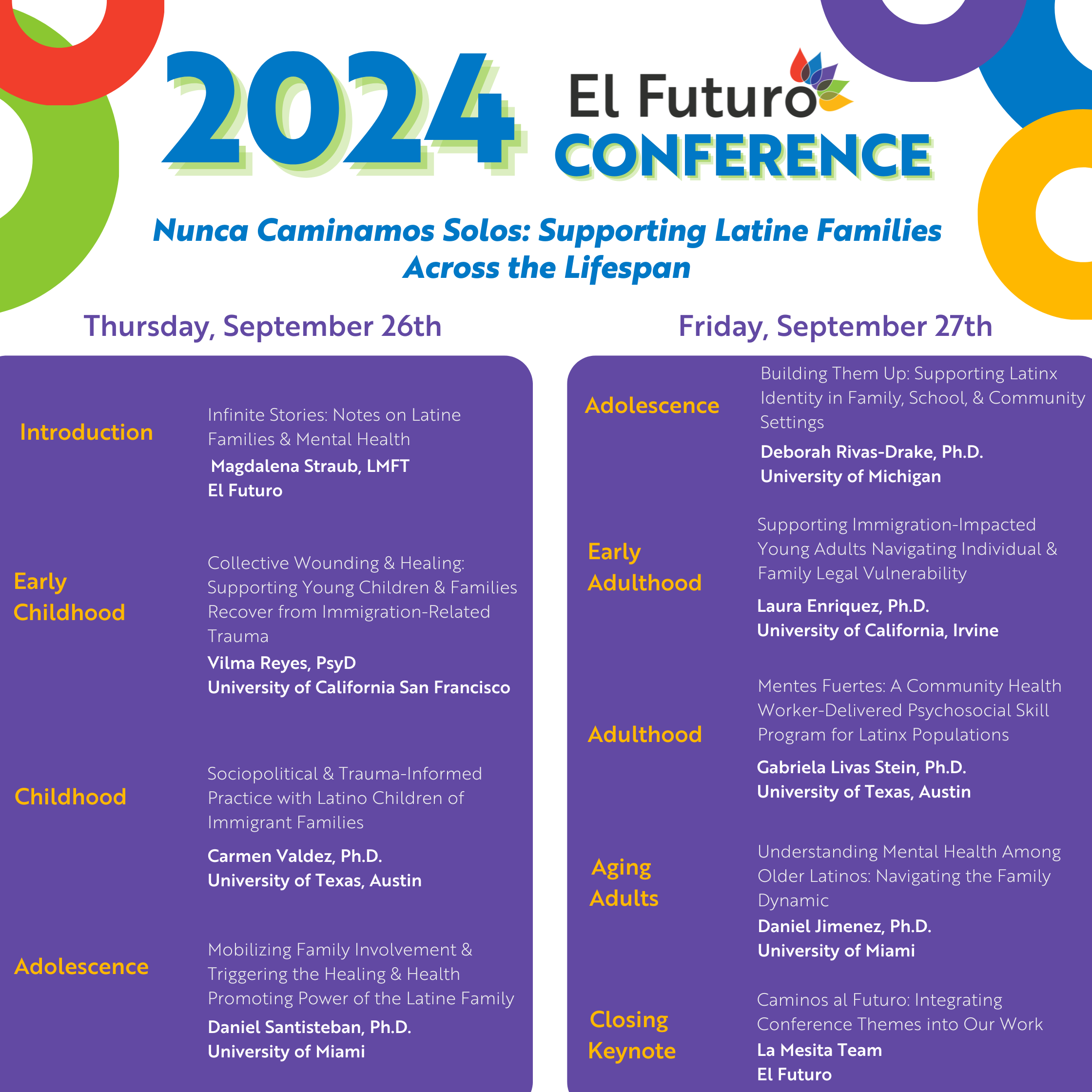
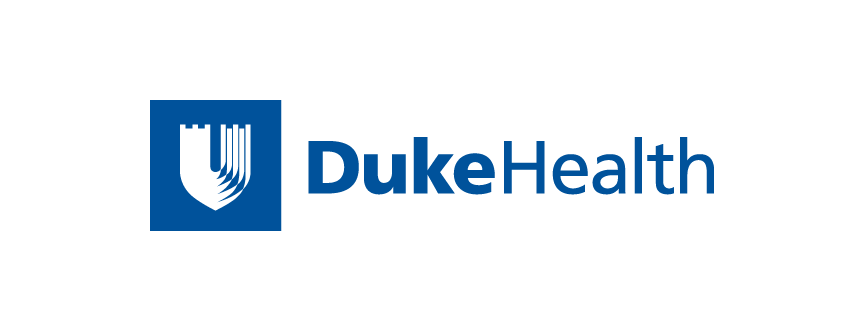
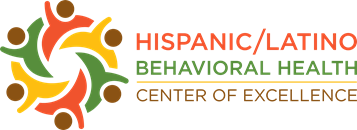
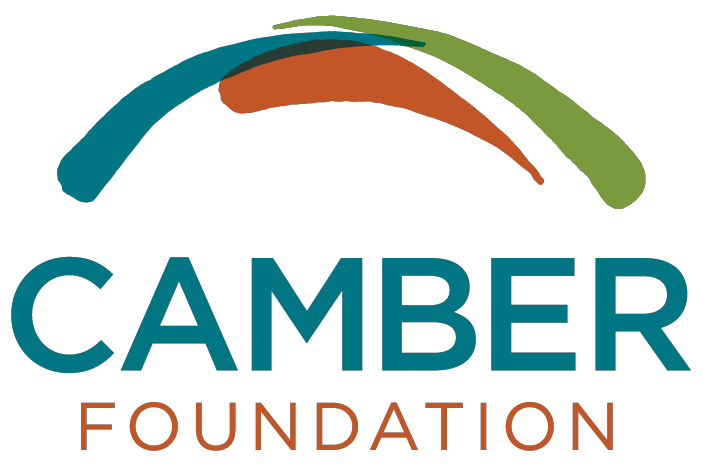
 Alvely Alcántara, LCSW
Alvely Alcántara, LCSW Rossy C. Garcia, MEd
Rossy C. Garcia, MEd  Katy Sims, MD
Katy Sims, MD  Everardo Aviles, LCSW, LCAS (Eve)
Everardo Aviles, LCSW, LCAS (Eve) As a medical anthropologist and social work researcher, Dr. Gulbas’ research embodies interdisciplinarity through the integration of applied theories of health and human development with qualitative and ethnographic methodologies. Her work seeks to understand how people—children, families, and providers—navigate complex sociocultural landscapes in the pursuit of mental health. Most of her work, to date, focuses attention on developing more robust interpretations of suicide risk. With funding from the National Institutes of Mental Health, this body of research has contributed to advancements in theoretical and empirical knowledge of the broader contexts within which youth suicide risk is situated.
As a medical anthropologist and social work researcher, Dr. Gulbas’ research embodies interdisciplinarity through the integration of applied theories of health and human development with qualitative and ethnographic methodologies. Her work seeks to understand how people—children, families, and providers—navigate complex sociocultural landscapes in the pursuit of mental health. Most of her work, to date, focuses attention on developing more robust interpretations of suicide risk. With funding from the National Institutes of Mental Health, this body of research has contributed to advancements in theoretical and empirical knowledge of the broader contexts within which youth suicide risk is situated.  R. Gabriela Barajas-Gonzalez is a developmental psychologist and an assistant professor of Population Health at NYU Grossman School of Medicine. Dr. Barajas-Gonzalez is the principal investigator of a study that examines the impact of immigration-related threat and stress on school communities. She earned a PhD in developmental psychology from Columbia University and hold a BA in human biology from Stanford University. Dr. Barajas-Gonzalez is the daughter of Mexican immigrants and a first gen college student.
R. Gabriela Barajas-Gonzalez is a developmental psychologist and an assistant professor of Population Health at NYU Grossman School of Medicine. Dr. Barajas-Gonzalez is the principal investigator of a study that examines the impact of immigration-related threat and stress on school communities. She earned a PhD in developmental psychology from Columbia University and hold a BA in human biology from Stanford University. Dr. Barajas-Gonzalez is the daughter of Mexican immigrants and a first gen college student.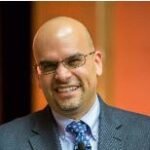 Dr. Parra-Cardona is an Associate Professor in the Steve Hicks School of Social Work (SHSSW) at the University of Texas at Austin. At the SHSSW, he serves as Coordinator for Mexico and Latin American initiatives. He also serves as Area Director for Research at the UT Austin Latino Research Institute. Dr. Parra-Cardona’s program of research is focused on the cultural adaptation of evidence-based parenting interventions for low-income Latinx populations in the US and Latin America.
Dr. Parra-Cardona is an Associate Professor in the Steve Hicks School of Social Work (SHSSW) at the University of Texas at Austin. At the SHSSW, he serves as Coordinator for Mexico and Latin American initiatives. He also serves as Area Director for Research at the UT Austin Latino Research Institute. Dr. Parra-Cardona’s program of research is focused on the cultural adaptation of evidence-based parenting interventions for low-income Latinx populations in the US and Latin America. Bianka Reese, PhD, MSPH is a research scientist and program evaluator specializing in adolescent and young adult sexual and reproductive health. Her previous research in the experiences of Latinx LGBTQ+ youth stems from her work as the Research and Evaluation Manager at SHIFT NC (Sexual Initiatives For Teens), where she led largescale evaluations of multilevel, community-based sexual health promotion initiatives and research projects aimed at elevating the voices of diverse youth in North Carolina. Dr. Reese is currently the Senior Research Strategist at Creative Research Solutions, LLC, an award-winning national evaluation, research, and assessment firm.
Bianka Reese, PhD, MSPH is a research scientist and program evaluator specializing in adolescent and young adult sexual and reproductive health. Her previous research in the experiences of Latinx LGBTQ+ youth stems from her work as the Research and Evaluation Manager at SHIFT NC (Sexual Initiatives For Teens), where she led largescale evaluations of multilevel, community-based sexual health promotion initiatives and research projects aimed at elevating the voices of diverse youth in North Carolina. Dr. Reese is currently the Senior Research Strategist at Creative Research Solutions, LLC, an award-winning national evaluation, research, and assessment firm. Tania Connaughton-Espino, MPH is an independent researcher focused on adolescent and young adult sexual and reproductive health. Her interest in the experiences of Latinx LGBTQ+ youth stems from her previous work with SHIFT NC (Sexual Initiatives For Teens), where she led the training and evaluation department, conducted capacity-building workshops for youth serving professionals including on the topic of how to be more affirming of LGBTQ youth, and from her extensive experience working with the Latinx population in NC.
Tania Connaughton-Espino, MPH is an independent researcher focused on adolescent and young adult sexual and reproductive health. Her interest in the experiences of Latinx LGBTQ+ youth stems from her previous work with SHIFT NC (Sexual Initiatives For Teens), where she led the training and evaluation department, conducted capacity-building workshops for youth serving professionals including on the topic of how to be more affirming of LGBTQ youth, and from her extensive experience working with the Latinx population in NC. Maru Gonzalez, EdD is an Assistant Professor and Youth Development Specialist in the Department of Agricultural and Human Sciences at North Carolina State University. Her areas of inquiry include youth development with a focus on activism, social justice, and the experiences of LGBTQ+ young people across familial, school, and community contexts.
Maru Gonzalez, EdD is an Assistant Professor and Youth Development Specialist in the Department of Agricultural and Human Sciences at North Carolina State University. Her areas of inquiry include youth development with a focus on activism, social justice, and the experiences of LGBTQ+ young people across familial, school, and community contexts.  Nayeli Y. Chavez-Dueñas, PhD
Nayeli Y. Chavez-Dueñas, PhD Hector Y. Adames, PsyD
Hector Y. Adames, PsyD